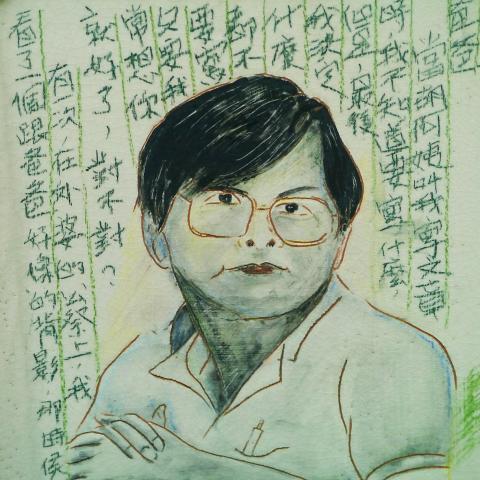An increasing number of young Taiwanese are taking an interest in the life and tragic end of Deng Nan-jung (鄭南榕), the executive director of the foundation named after the late democracy activist said yesterday on the 24th anniversary of Deng’s death by self-immolation.
The mood at the Deng Liberty Foundation, located on the recently renamed Freedom Lane in Taipei, was one of introspection as groups of people yesterday came to pay their respects to the former editor-in-chief of Freedom Era Weekly (自由時代週刊). Facing charges of sedition for his calls on the government to protect freedom of expression, Deng set himself ablaze in his office on April 7, 1989.
Ten years later, the same office, which by then had been turned into a human rights memorial hall, was opened to the public, showcasing a collection of photographs of Deng and other activists who fought for freedom in Taiwan under martial law. Hauntingly, Deng’s office remains as it was found after he committed the ultimate sacrifice, a reminder of a not-so-distant past.

Photo: J. Michael Cole, Taipei Times
Visitors yesterday honored the man by depositing red roses outside the charred room. A single white scarf, left behind by a Tibetan organization, graced the entrance to Deng’s study.
Addressing a group of several dozen visitors, foundation chief executive Tsao Chin-jung (曹欽榮) said he had observed in recent years a marked change in the interest among young people to learn more about Deng’s life and sacrifice.
He said the foundation was receiving more requests from students to visit it, to deepen their understanding of the man, whose Mainlander background had not diminished his commitment to Taiwan, as former president Chen Shui-bian (陳水扁), like Deng a former political prisoner, once said of him.
Thanks to the Internet and social media, interest in Deng’s life seems to be seeing a revival, Tsao said, adding that most young visitors today already had a fair understanding of Deng’s life and works.
Just as this correspondent was entering the memorial hall, he ran into Lin Fei-fan (林飛帆), a student leader who played a major role leading the anti-media monopoly movement against the attempted — now failed — acquisition of Next Media by a consortium that included Want Want China Times Group chairman Tsai Eng-meng (蔡衍明), whose close ties with the regime in Beijing have made him a controversial figure in the nation’s media environment.
Earlier in the day, Lin and several young activists had joined others during a ceremony at the Jinbaoshan Cemetery in New Taipei City (新北市) to honor Deng.
Young people have also sought other means to remember Deng. National Cheng Kung University’s 02 Group, whose members have pledged to continue to pursue the values that Deng sacrificed his life for, was scheduled to hold a candlelit vigil last night in memory of Deng.
Young Taiwanese were not the only ones who showed up to honor Deng. Following Tsao’s presentation at the foundation, a young Chinese student, who is studying at National Taiwan University, also made a brief speech.
Carrying a satchel he had just purchased from the foundation, the student said there were reasons to worry about Taiwan’s future, and he pointed to corruption within the Chinese Nationalist Party (KMT) as the main problem.

ANOTHER EMERGES: The CWA yesterday said this year’s fourth storm of the typhoon season had formed in the South China Sea, but was not expected to affect Taiwan Tropical Storm Gaemi has intensified slightly as it heads toward Taiwan, where it is expected to affect the country in the coming days, the Central Weather Administration (CWA) said yesterday. As of 8am yesterday, the 120km-radius storm was 800km southeast of Oluanpi (鵝鑾鼻), Taiwan’s southernmost tip, moving at 9kph northwest, the agency said. A sea warning for Gaemi could be issued tonight at the earliest, it said, adding that the storm is projected to be closest to Taiwan on Wednesday or Thursday. Gaemi’s potential effect on Taiwan remains unclear, as that would depend on its direction, radius and intensity, forecasters said. Former Weather Forecast

As COVID-19 cases in Japan have been increasing for 10 consecutive weeks, people should get vaccinated before visiting the nation, the Centers for Disease Control (CDC) said. The centers reported 773 hospitalizations and 124 deaths related to COVID-19 in Taiwan last week. CDC Epidemic Intelligence Center Director Guo Hung-wei (郭宏偉) on Tuesday said the number of weekly COVID-19 cases reported in Japan has been increasing since mid-May and surpassed 55,000 cases from July 8 to July 14. The average number of COVID-19 patients at Japan’s healthcare facilities that week was also 1.39 times that of the week before and KP.3 is the dominant

The Chinese Communist Party’s (CCP) working group for Taiwan-related policies is likely to be upgraded to a committee-level body, a report commissioned by the Mainland Affairs Council (MAC) said. As Chinese President Xi Jinping (習近平) is increasingly likely to upgrade the CCP’s Central Leading Group for Taiwan Affairs, Taiwanese authorities should prepare by researching Xi and the CCP, the report said. At the third plenary session of the 20th Central Committee of the CCP, which ended on Thursday last week, the party set a target of 2029 for the completion of some tasks, meaning that Xi is likely preparing to

US-CHINA TRADE DISPUTE: Despite Beijing’s offer of preferential treatment, the lure of China has dimmed as Taiwanese and international investors move out Japan and the US have become the favored destinations for Taiwanese graduates as China’s attraction has waned over the years, the Ministry of Labor said. According to the ministry’s latest income and employment advisory published this month, 3,215 Taiwanese university graduates from the class of 2020 went to Japan, surpassing for the first time the 2,881 graduates who went to China. A total of 2,300 graduates from the class of 2021 went to the US, compared with the 2,262 who went to China, the document showed. The trend continued for the class of 2023, of whom 1,460 went to Japan, 1,334 went to